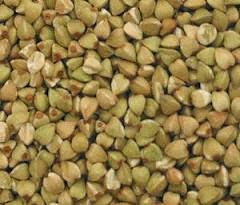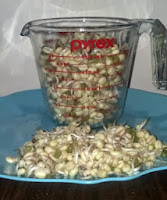Today I'm sharing MORE of the Health Benefits of Sprouts by variety.
Adzuki Beans, Lentils, Peas and White Beans from Juicing for Health
Bean sprouts are a true concentrate of energy and nutritive principles. Unlike ripe vegetables, whose nutritional value progressively decreases after they have been harvested, bean sprouts retain their nutritional properties until consumed.
Bean sprouts have the richest source of amino acids (for protein), vitamins and minerals, and also contain a good amount of fiber. They contain all types of vitamins (A, B, C, D, E and K), folate and are an excellent source of iron, potassium, calcium, phosphorous, magnesium and zinc.
Alfalfa sprouts according to LiveStrong:
 |
| Alfalfa Sprouts |
Alfalfa sprouts are a good source of several micronutrients, or vitamins. NutritionData reports that alfalfa sprouts contain B vitamins such as niacin, thiamin, riboflavin, folate, pantothenic acid and vitamin B6. Additionally, alfalfa sprouts provide roughly 13 percent of an adult's recommended daily intake of vitamin K. Because of alfalfa's high vitamin K content, the National Institutes of Health advise patients taking blood-thinners to avoid foods and supplements made from the plant.
Broccoli sprouts according to Livestrong:
 |
| Sprouted Broccoli seeds |
Asthma sufferers may benefit from a daily dose of broccoli sprouts, as studies have shown a decrease in inflammation of the airways after eating the vegetable. A study reported in the March 2009 issue of Clinical Immunology reports that sulforaphane, the same compound that can prevent and fight cancer, reduced inflammation associated with asthma and nasal allergies. In addition to broccoli sprouts, sulforaphane is naturally occurring in cauliflower, mature broccoli, brussels sprouts and cabbage.
Buckwheat Sprouts according to Zhion
 |
| Buckwheat Groats (seeds) |
The Potential Health Benefits of Buckwheat
Buckwheat sprout was found to contain quercetin, I-ascorbic acid, oxalic, malic, tartaric, and citric acids, rutin, and gamma-aminobutyric acid. Animal / cell studies suggest that buckwheat may have benefits of anti-cancer, cholesterol lowering, triglyceride lowering and anti-oxidative activities. [4,6]
Extracts of buckwheat spouts were found to have anti-inflammatory activities in a study of lipopolysaccharide-treated mice. After the intake of lipopolysaccharide, the inflammatory cytokines, such as interleukin 6 and tumor necrosis factor alpha were markedly up-regulated in the spleen and liver. [2] While, buckwheat hull extract was shown to have neurological protection against trimethyltin in a study of rats. [3]
 |
| Fenugreek Sprouts |
Fenugreek sprouts provide a large source of protein and a
smaller amount of carbohydrates due to the sprouting process compared to other
legumes. The soaking process of seed to sprout allows for enzymatic reactions
to occur, providing easily digested proteins. The enzyme amylase breaks down
complex carbohydrates found in the seeds to simple carbohydrates that are
washed away during the rinsing process. Lipase, an enzyme that breaks down fat,
creates a usable form of fat that is easily absorbed in the body.
Fenugreek can be used as spice, digestive aid, hair growth supplement and expectorant. Fenugreek may help stimulate milk production in nursing women and may aid in menopausal symptoms such as hot flashes and breast tenderness. Fenugreek may also help to naturally lower cholesterol and aid in blood-sugar control in people who have diabetes.
Fenugreek provides a variety of vitamins, minerals, proteins, healthy fats and fiber. One teaspoon of fenugreek contains 12 calories, 0.85 g protein, 0.24 g fat, 0.9 g fiber, 7 mg calcium, 1.24 mg iron, 7 mg magnesium, 11 mg phosphorus and 28 mg potassium.
Fenugreek can be used as spice, digestive aid, hair growth supplement and expectorant. Fenugreek may help stimulate milk production in nursing women and may aid in menopausal symptoms such as hot flashes and breast tenderness. Fenugreek may also help to naturally lower cholesterol and aid in blood-sugar control in people who have diabetes.
Fenugreek provides a variety of vitamins, minerals, proteins, healthy fats and fiber. One teaspoon of fenugreek contains 12 calories, 0.85 g protein, 0.24 g fat, 0.9 g fiber, 7 mg calcium, 1.24 mg iron, 7 mg magnesium, 11 mg phosphorus and 28 mg potassium.
Mung Bean sprouts according to Livestrong:
Mung bean sprouts have a low calorie density, or energy density, with only 31 calories per 104 g serving. Low energy-dense foods can help you lose weight or prevent weight gain because they are relatively low in calories compared to their serving size, so you can fill up on them without eating too many calories, according to MayoClinic.com. Low energy-dense foods tend to be low in fat and high in dietary fiber, and mung bean sprouts have almost no fat and nearly 2 g dietary fiber per serving.
 |
| Sprouted Mung Beans |
Each 1-cup serving of raw mung bean sprouts provides 14 mg vitamin C, or nearly one quarter of the daily value for vitamin C. Vitamin C is an antioxidant vitamin that is essential for proper immune function and wound healing. Another benefit of mung bean sprouts is their 60 mcg folic acid, or 15 percent of the daily value for this B vitamin, which is an especially important nutrient for women who may become pregnant, because it reduces the risk for neural tube birth defects.
A benefit of mung bean sprouts is that more than 90 percent of their weight is water, and you can use them, like other vegetables, to help you stay hydrated, according to the University of Michigan. Mung bean sprouts are a cholesterol-free food, and their dietary fiber can lower levels of bad LDL cholesterol in your blood.
Hard Red Wheat sprouts according to Natural Therapy Pages
 |
| Sprouted Hard Red Wheat |
There you have it!!! Are you ready to get SPROUTING?
Mary's Heirloom Seeds offers great deals on
100% Organic Sprout Seeds and Sprouting Supplies.
How about Detailed Sprouting Instructions? I don't have instructions for all of the varieties available online yet but I'm working on it. Instructions are included with each purchase of sprouting seeds.
Additional SPROUTING SEEDS
GREEN PEAS
MARY'S PROTEIN POWER MIX
EINKORN BERRIES
WHEATGRASS KITS
**Bulk options available upon request**
Additional SPROUTING SEEDS
GREEN PEAS
MARY'S PROTEIN POWER MIX
EINKORN BERRIES
WHEATGRASS KITS
**Bulk options available upon request**
Tutorials:
Sign up for our E-Newsletter



5 comments
I am going to try all of these varieties!!
II just tried container gardening this past summer late (first week of June) but now I have the gardening bug and am putting in some raised beds. I just got interested in microgreens because I want something growing NOW (lol) and I love all the information with additional links for all the sprouts! Thank you!
Hi Marla!
Mung Bean, Alfalfa and Broccoli are excellent choices for sprouting. Mung Bean is probably the easiest but Alfalfa and Broccoli are pretty easy as well.
Hi Mary,
I have wanted to start growing sprouts for a while now, but was never sure my digestive system could tolerate them. Could you tell what would be the easiest on the digestive? I think I want to stay away from any kind of grain.
Thanks for the info.Sharing.
Visiting from Let’s Get Real- thanks for reminding me about the amazing benefits of sprouting. Going to the kitchen to start some mung bean sprouts right now..